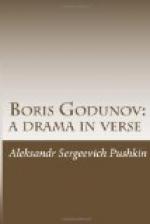A monastery; the very rakehells seemed
Obedient monks, the terrible tsar appeared
A pious abbot. Here, in this very cell
(At that time Cyril, the much suffering,
A righteous man, dwelt in it; even me
God then made comprehend the nothingness
Of worldly vanities), here I beheld,
Weary of angry thoughts and executions,
The tsar; among us, meditative, quiet
Here sat the Terrible; we motionless
Stood in his presence, while he talked with us
In tranquil tones. Thus spake he to the abbot
And all the brothers: “My fathers, soon will come
The longed-for day; here shall I stand before you,
Hungering for salvation; Nicodemus,
Thou Sergius, Cyril thou, will all accept
My spiritual vow; to you I soon shall come
Accurst in sin, here the clean habit take,
Prostrate, most holy father, at thy feet.”
So spake the sovereign lord, and from his lips
Sweetly the accents flowed. He wept; and we
With tears prayed God to send His love and peace
Upon his suffering and stormy soul.—
What of his son Feodor? On the throne
He sighed to lead the life of calm devotion.
The royal chambers to a cell of prayer
He turned, wherein the heavy cares of state
Vexed not his holy soul. God grew to love
The tsar’s humility; in his good days
Russia was blest with glory undisturbed,
And in the hour of his decease was wrought
A miracle unheard of; at his bedside,
Seen by the tsar alone, appeared a being
Exceeding bright, with whom Feodor ’gan
To commune, calling him great Patriarch;—
And all around him were possessed with fear,
Musing upon the vision sent from Heaven,
Since at that time the Patriarch was not present
In church before the tsar. And when he died
The palace was with holy fragrance filled.
And like the sun his countenance outshone.
Never again shall we see such a tsar.—
O, horrible, appalling woe! We have sinned,
We have angered God; we have chosen for our ruler
A tsar’s assassin.
Gregory. Honoured father, long
Have I desired to ask thee of the death
Of young Dimitry, the tsarevich; thou,
’Tis said, wast then at Uglich.
Pimen. Ay, my son,
I well remember. God it was who led me
To witness that ill deed, that bloody sin.
I at that time was sent to distant Uglich
Upon some mission. I arrived at night.
Next morning, at the hour of holy mass,
I heard upon a sudden a bell toll;
’Twas the alarm bell. Then a cry, an uproar;
Men rushing to the court of the tsaritsa.
Thither I haste, and there had flocked already
All Uglich. There I see the young tsarevich
Lie slaughtered: the queen mother in a swoon
Bowed over him, his nurse in her despair
Wailing; and then the maddened people drag
The godless, treacherous nurse away. Appears




